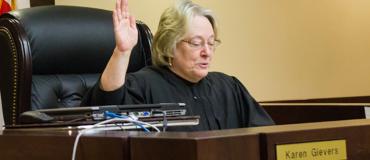
For the last five days I've been asking myself the same question, and I can't stand it anymore. It's time I asked it out loud. Why didn't Judge Karen Gievers of Florida's 2nd Judicial Circuit recuse herself?
Gievers, the judge who on the face of it looks like a hero for voiding the 14.5 percent workers' comp increase, is up to her eyeballs in conflict of interest.
She is, in fact, the signal fire for a Florida workers' compensation system gone horribly wrong.
I met her literally decades ago in Stuart when she was running for insurance commissioner. She was also a leading lawyer in personal injury and commercial litigation, is past president of the Dade County Bar Association and past president of the Academy of Florida Trial Lawyers.
 In fact, on Thursday Peter Schorsch regaled her Academy of Florida Trial Lawyer experience on Floridapolitics.com: "Gievers served as chair of the public committee from 1984-1986, on the board directors from 1985-1987, and as treasurer (1988-1989), secretary (1987-1988), president-elect (1989-1990) and president (1990-1991)." Whoa!
In fact, on Thursday Peter Schorsch regaled her Academy of Florida Trial Lawyer experience on Floridapolitics.com: "Gievers served as chair of the public committee from 1984-1986, on the board directors from 1985-1987, and as treasurer (1988-1989), secretary (1987-1988), president-elect (1989-1990) and president (1990-1991)." Whoa!
Can Gievers be truly dispassionate? Perhaps. But as a circuit judge in another district reminded me, this is a high-profile case. And that 14.5 percent increase, as applied to new and renewal workers' comp policies written during the next 12 months, would cost employers $1.5 billion. "A good judge backs away when there could be even the slightest perception of a conflict of interest," he said. Gievers didn't back away.
I asked Chief Judge Jonathan Sjostrom how Gievers got assigned the case. He told me he couldn't talk about a specific case or the judge on it. But he would explain how the system works.
"We have a blind rotation system," he explained. "Every two years an attorney's area of interest is changed. As cases come up, a machine picks the next judge on the list."
Sjostrom said if that judge sees or feels any conflict of interest, he/she can just turn the assignment down and the computer will go to the next judge on the list.
Gievers, God knows why, apparently saw no conflict of interest.
But I won't lay all this at Gievers' feet. There's plenty of blame to go around. Surely lawyers representing business interests knew -- in fact, all lawyers in the case must have known -- this judge's long and close ties to trial lawyers. None of them asked Gievers to recuse herself. Why is that, I wonder?
Something like this never smells right.
The day before Thanksgiving Gievers ruled that in setting the new 14.5 percent rate, state officials and the National Council on Compensation Insurance (NCCI), the insurers’ rating organization, were not in compliance with Florida’s Sunshine Laws and open meeting requirements.
When, as expected, the Florida Office of Insurance Regulation filed its appeal this week, Gievers' stay disappeared until the appeal can be heard. The rate increase took effect as originally set, on Thursday.
Gievers, Leon County attorneys tell me, has one of the highest rates -- if not the highest rate -- of overturned cases in the district.
Gievers had gone after NCCI for its secretive meetings. Meanwhile, behind the scenes the trial lawyers were diving back into claims dating back to 2009 -- stay or no stay -- still able to collect the big fees they were denied before workers' comp claims were capped.
"You've got trial lawyers coming out of retirement so they can collect the bigger fees from past claims," Associated Industries of Florida Senior Vice President for State and Federal Affairs Brewster Bevis said Tuesday.
And that's why Bill Herrle, National Federation of Independent Business/Florida executive director, said, “What’s clear is the trial lawyers, who are the opponents of the workers’ comp attorney fee cap, brought this case in an attempt to conceal the fees they are charging. They wish to discredit the insurance commissioner’s findings that attorneys’ fees, which will grow by hundreds of millions next year alone, are driving increased workers’ comp costs."
And it's also why Edie Ousley, the Florida Chamber of Commerce's vice president of public affairs said Tuesday, “We urged Florida businesses not to be fooled by this classic trial lawyer delay tactic. Putting job creators and injured workers first is vital to keeping Florida’s workers’ compensation system working."
Ousley said it's "incumbent on the Florida Legislature to reform the system and create stability and predictability so that job creators aren’t forced to choose between hiring another employee or paying higher workers’ comp rates.”
All of this would have happened with or without Judge Karen Gievers. But the fact that no one rose to oppose her hearing the case -- least of all herself -- adds to the concern.
Meanwhile, big pay day all around for the trial lawyers.
Reach Nancy Smith at nsmith@sunshinestatenews.com or at 228-282-2423. Twitter: @NancyLBSmith


